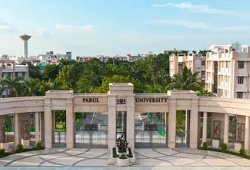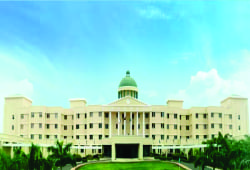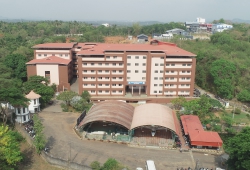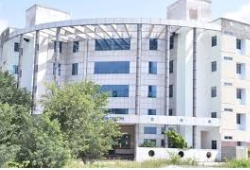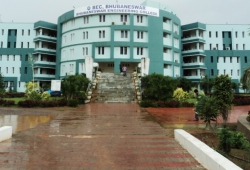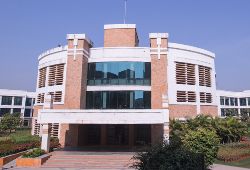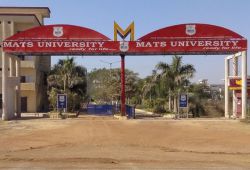Uttar Pradesh is known for its rich culture and tradition. The Taj Mahal, one of the new Seven Wonders of the World in Agra, is also located in Uttar Pradesh. There are various Aeronautical Engineering colleges in UP in which students can study and build their marvelous career. The career opportunities in the aviation sector is very high which leads to great salary packages.

Best Aeronautical Engineering Colleges in Uttar Pradesh
Some of the best universities for aeronautical engineering are located in Uttar Pradesh, a state rich in history and development. These establishments are renowned for their steadfast dedication to academic success, guaranteeing that students obtain an elite education. These universities prepare future aeronautical engineers for rewarding careers in the aviation and aerospace industries by emphasizing hands-on training and the most recent industry knowledge. Uttar Pradesh's colleges of aeronautical engineering offer the perfect setting for pursuing your goals, whether they are to design aircrafts, explore space, or conduct cutting-edge research.
Aeronautical Engineering Course fees in Uttar Pradesh
Let's explore the Aeronautical Engineering Course Fees in Uttar Pradesh based on degree levels:
Diploma in Aeronautical Engineering
- Aeronautical engineering diploma programs are frequently more reasonably priced and provide a great foundation for those just starting out in the industry. Depending on the institution, these programs usually last one to two years and cost between INR 40,000 and INR 1,00,000.
Bachelor's Degree in Aeronautical Engineering
- A bachelor's degree is a common option for those seeking a thorough education in aeronautical engineering. Usually, the program lasts four years. Fees in Uttar Pradesh, especially at prestigious institutions, can range from INR 1,00,000 to INR 4,00,000 or more.
Master's Degree in Aeronautical Engineering
- People who want to specialize and progress in their careers frequently enroll in Master's programs in Aeronautical Engineering. Depending on the reputation of the institution, these programs can cost anywhere from INR 1,50,000 to INR 6,00,000 and usually last for two years.
Scholarships and Financial Aid
- As previously stated, financial aid and scholarships can play a significant role in lessening the financial load. In Uttar Pradesh, a large number of public and private institutions provide grants and scholarships to worthy students. By looking into and applying for these opportunities, you can lower the cost of your education.
Eligibility Criteria for Aeronautical Engineering Colleges in Uttar Pradesh
Eligibility criteria for admission to Aeronautical Engineering Colleges in Uttar Pradesh typically include:
- Academic Qualifications: Having a solid background in mathematics, physics, and chemistry and passing the 10+2 exam.
- Entrance Examinations: Passing state-level engineering entrance exams or entrance exams such as JEE Main, JEE Advanced, or AME CET.
- Minimum Aggregate Marks: Minimum aggregate marks (usually 50% or higher) in the qualifying examination.
- Additional Entrance Exams: Candidates may need to pass extra entrance exams administered by the individual colleges in order to be admitted to some of them.
- Age and Nationality: In order to be eligible, applicants may need to meet certain nationality or age restrictions set by particular colleges.
Aeronautical Engineering Campus Facilities in Uttar Pradesh
For practical instruction and state-of-the-art research, aeronautical engineering education significantly depends on specialized facilities and infrastructure. In this article, we examine the cutting-edge resources offered by aeronautical colleges in Uttar Pradesh, a major center for the Indian aerospace sector.
- Cutting-Edge Laboratories: These labs give students a practical understanding of aviation technology by housing wind tunnels, material testing equipments, and flight simulation tools.
- Aircraft Maintenance Hangars: Hangars on campus where students can get hands-on experience fixing and maintaining aircrafts.
- Rich Library Resources: Libraries that are well-stocked with a vast array of books, research papers, and internet resources to help students learn more and do research.
- Aviation Workshops: Workshops with the instruments and equipment needed to construct and modify aircraft parts provide hands-on experience in aircraft engineering.
- Computer Labs: Computer labs with software for engineering projects and aerodynamic simulations allow students to use technology in their education.
- Interactive Classrooms: The educational experience is improved by the use of audio-visual aids in modern classrooms that promote interactive learning.
- Research Centers: Committed to state-of-the-art aerospace research, offering students chances to work on creative projects.
- Hostel Facilities: On-campus housing promotes a feeling of community and togetherness while ensuring students' safety and convenience.
- Sports and Recreation: Sports fields, gyms, and cultural clubs provide a well-rounded lifestyle that supports students' mental and physical health.
Aeronautical Engineering Colleges Admission Process in Uttar Pradesh
The admission process for aeronautical engineering colleges in Uttar Pradesh through AME CET entails the following steps:
- Application: The first step for prospective students is to fill out the AME CET application form with all the required information.
- Entrance Exam: The AME CET exam, which evaluates candidates' knowledge and proficiency in aircraft maintenance engineering, must be taken.
- Counseling: Eligible candidates are invited to attend counseling sessions following the announcement of the exam results. Based on their AME CET rankings and the number of seats available, students can choose the colleges and courses they want to take during these sessions.
- Document Verification: Candidates must provide necessary documentation, such as their identification documents, AME CET scorecards, and educational certificates, as part of the counseling process.
- Seat Allotment: Candidates are given seats by colleges according to their selections and performance on the AME CET Exam.
- Fee Payment: To guarantee their spot at the selected college, admitted students must pay the necessary fees.
- Reporting to College: Lastly, in order to finish the admissions requirements and start their aeronautical engineering program, students who were accepted through the AME CET must report to their respective colleges on the specified date.
Aeronautical Engineering Entrance Exam in India
Standardized tests called entrance exams for aeronautical engineering are used to evaluate the skill, knowledge, and abilities of prospective students hoping to work in the field. These tests are essential to the admissions process for many Indian colleges and universities' aeronautical engineering programs.
- Joint Entrance Examination (JEE) Main: The national entrance exam known as JEE Main assesses applicants' knowledge of mathematics, physics, and chemistry. JEE Main scores are taken into account for admission to many esteemed engineering colleges, including those in Uttar Pradesh.
- Joint Entrance Examination (JEE) Advanced: For candidates who pass JEE Main, the next step is JEE Advanced. Admission to the esteemed Indian Institutes of Technology (IITs), some of which provide programs in aeronautical engineering, is determined by this.
- Aircraft Maintenance Engineering Common Entrance Test (AME CET): The AME CET was created especially for admission to programs in aircraft maintenance engineering, which is closely related to aeronautical engineering. Colleges in Uttar Pradesh and other parts of India that offer these programs accept it.
- State-Level Engineering Entrance Exams: Numerous Indian states administer engineering entrance exams, and students can use their results to gain admission to state-specific aeronautical engineering programs.
Download Brochure for Aeronautical Engineering Colleges in Uttar Pradesh
Download the brochure now for a thorough rundown of Uttar Pradesh's Aeronautical Engineering Colleges, including information on programs, staff, and facilities. Today, start down the path to a thrilling career in aeronautical !
Specializations in Aeronautical Engineering
With a variety of specialized programs available, the multidisciplinary field of aeronautical engineering enables students to customize their education to fit particular interests within the aerospace sector. To meet the various needs of the aviation and aerospace industries, Uttar Pradesh's aeronautical engineering colleges provide a wide range of specialized programs:
- Aircraft Design and Manufacturing: Focuses on the development of aircraft, including topics such as materials, manufacturing procedures, structural design, and aerodynamics. Students become proficient in creating safe and effective aircraft designs.
- Aerospace Propulsion: Focuses on propulsion systems, rockets, and aircraft engines. Students gain knowledge of engine design, flight mechanics, and propulsion principles.
- Avionics and Control Systems: Focuses on the electronic systems found in aircrafts, such as flight control, navigation, and communication. This area of expertise explores the technology that maintains the efficiency and safety of aircrafts.
- Aircraft Maintenance and Repair: Focuses on aircraft maintenance, inspection, and repair. Students become experts in ensuring the airworthiness and safety of aircraft, making them indispensable in the aviation industry.
- Space Technology and Exploration: Explores satellite technology, space mission planning, and spacecraft design. Projects involving satellites, space missions, and interplanetary exploration may be undertaken by students.
- Aeronautical Research and Development: Emphasizes cutting-edge research in aeronautics. Students engage in projects that push the boundaries of aerospace technology and innovation.
- Unmanned Aerial Vehicles (UAVs) and Drones: Focuses on the design, operation, and application of unmanned aerial vehicles for tasks like surveillance, delivery, and data collection.
- Aerospace Management: Geared towards students interested in the business side of the aviation industry, covering topics like aviation operations, airline management, and aviation marketing.
Higher Qualifications in Aeronautical Engineering
The field of aeronautical engineering is dynamic and constantly changing. Professionals who wish to work in cutting-edge research, specialize in particular fields, or progress their careers may find that pursuing higher education opens up a world of opportunities. Aeronautical engineers may want to take into consideration the following additional qualifications:
- Master's in Aeronautical Engineering (M. Tech/MS): Professionals can specialize in areas such as structural design, propulsion systems, or aerodynamics with a postgraduate degree in aeronautical engineering. It's a great option for people who want to work in research or in more technical roles.
- Doctor of Philosophy (Ph.D.) in Aeronautical Engineering: A Ph.D. in aeronautical engineering provides the opportunity to significantly advance the field for individuals who are passionate about research and innovation. Careers in academia, research, or senior roles in the aerospace sector may be available to those with this qualification.
- Master of Business Administration (MBA): In the aerospace sector, combining an MBA with a technical background can lead to management and leadership positions. Business-savvy aeronautical engineers are extremely useful for managing aerospace projects and making strategic choices.
- Certifications and Licenses: A licensed aircraft maintenance engineer (AME) or certification in a particular software or technology utilized in the aerospace industry are just two of the many licenses and certifications that aeronautical engineers can pursue.
- Short-Term Courses and Workshops: Attending short-term courses, workshops, and seminars provided by academic institutions and industry associations can help aeronautical engineers stay current on the most recent developments in the field.
- Specialized Master's Programs: A well-rounded education with a specific focus is provided by certain universities' specialized master's programs in fields like space technology, aviation safety, or aerospace management.
- Online Courses and Massive Open Online Courses (MOOCs): Numerous online courses and MOOCs covering a wide range of aerospace-related topics are offered on platforms such as Coursera, edX, and Udemy. These can be an adaptable and affordable way to learn new things.
Top Recruiters for Aeronautical Engineering Graduates
Gaining knowledge of the best recruiters can help you make better decisions about your future employment. Here, we highlight the businesses that actively seek out Uttar Pradesh graduates with degrees in aeronautical engineering. Because of their proficiency in aviation and aerospace technology, Indian graduates of aeronautical engineering are in great demand across a range of industries. Graduates in aeronautical engineering are in high demand by the following top recruiters:
- Indian Space Research Organization (ISRO): ISRO offers exciting career opportunities in satellite development, rocket propulsion, and space exploration projects.
- Hindustan Aeronautics Limited (HAL): HAL, a major aerospace and defense company, recruits aeronautical engineers for roles in aircraft and helicopter manufacturing.
- Defense Research and Development Organization (DRDO): DRDO's aeronautical engineers work on defense technology projects, such as avionics and missile development.
- Bharat Heavy Electricals Limited (BHEL): To work on gas turbine equipment used in power generation, BHEL employs aeronautical engineers.
- National Aeronautics Laboratory (NAL): Aeronautical engineers help with aircraft design, wind tunnel testing, and aerodynamic research, and NAL is primarily focused on aerospace research.
- Air India: Aeronautical engineers are employed by the national carrier to maintain and engineer aircraft, guaranteeing flight safety.
- Private Aerospace Companies: Numerous career options in aerospace technology and manufacturing are offered by organizations such as Tata Advanced Systems, L&T, and Mahindra Aerospace.
- Aviation Companies: airlines such as indigo, spicejet, and Vistara hire aeronautical engineers for aircraft maintenance and safety roles.
- Research and Development Centers: Aeronautical engineering graduates can engage in cutting-edge research in educational institutions, research centers, and independent organizations.
- Consulting and Engineering Firms: Consulting giants like Wipro, TCS, and Infosys have aerospace divisions that offer engineering solutions to the aviation and aerospace industry.
Aeronautical Engineering Course Syllabus
Understanding the syllabus is crucial for prospective students. We'll provide an overview of the typical curriculum and subjects covered in aeronautical engineering programs in India.
Aeronautical engineering is an intricate and dynamic field that focuses on the design, development, and maintenance of aircraft and spacecraft. In the city of Uttar Pradesh, a major hub of the Indian aerospace industry, several prestigious colleges offer aeronautical engineering programs. This article delves into the syllabus of aeronautical engineering colleges in Uttar Pradesh, providing aspiring students with an overview of what they can anticipate during their academic journey.
First Year Courses
1. Mathematics and Applied Mathematics
- Calculus
- Linear Algebra
- Differential Equations
- Probability and Statistics
2. Physics
- Mechanics
- Electromagnetism
- Waves and Optics
3. Engineering Mechanics
- Statics and Dynamics
- Kinematics and Kinetics
- Equilibrium of Structures
4. Engineering Graphics
- Geometrical drawing
- Projections
- Sectional views
Second Year Courses
5. Aerodynamics
- Fundamental principles
- Compressible and incompressible flows
- Boundary layers
6. Fluid Mechanics
- Fluid properties and behavior
- Fluid statics and dynamics
- Control volume analysis
7. Materials Science and Engineering
- Properties of materials
- Material selection for aerospace applications
- Heat treatment and material testing
8. Thermodynamics
- Basic concepts
- Laws of thermodynamics
- Gas dynamics
Third Year Courses
9. Aircraft Structures
- Structural analysis
- Stress and strain analysis
- Finite element analysis
10. Aircraft Propulsion
- Gas turbine engines
- Jet propulsion
- Propeller theory
11. Aircraft Design and Manufacturing
- Design process
- Manufacturing techniques
- Composite materials in aircraft design
12. Avionics and Control Systems
- Avionics components and systems
- Aircraft control systems
- Flight control systems
Fourth Year Courses
13. Flight Mechanics and Aircraft Performance
- Aircraft performance parameters
- Stability and control
- Flight testing
14. Aircraft Maintenance and Repair
- Maintenance practices
- Aircraft inspection and repair
- Regulatory compliance
15. Aerospace Propulsion Systems
- Advanced propulsion systems
- Rocket propulsion
- Hybrid propulsion
16. Project Work and Internships
- Final year project
- Industry internships
Aeronautical Engineering Course Duration
For a bachelor's degree in aeronautical engineering, courses typically last four years, or eight semesters. Students are exposed to a broad curriculum during this time, which gives them the information and abilities they need to succeed in the field. For those who want to pursue lucrative careers in aerospace engineering, these four years provide a solid foundation that allows them to participate in the development, maintenance, and design of aircraft and spacecraft.



